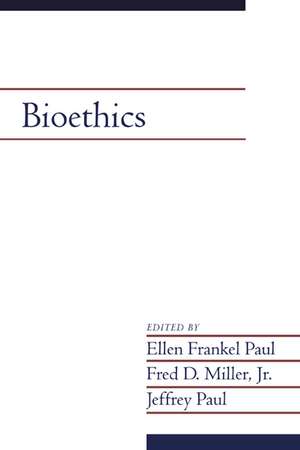Bioethics: Volume 19, Part 2: Social Philosophy and Policy
Editat de Ellen Frankel Paul, Fred D. Miller, Jr, Jeffrey Paulen Limba Engleză Paperback – 21 iul 2002
Din seria Social Philosophy and Policy
-
 Preț: 230.21 lei
Preț: 230.21 lei -
 Preț: 222.71 lei
Preț: 222.71 lei -
 Preț: 227.33 lei
Preț: 227.33 lei -
 Preț: 226.17 lei
Preț: 226.17 lei -
 Preț: 322.12 lei
Preț: 322.12 lei -
 Preț: 225.79 lei
Preț: 225.79 lei -
 Preț: 228.69 lei
Preț: 228.69 lei -
 Preț: 228.85 lei
Preț: 228.85 lei -
 Preț: 232.33 lei
Preț: 232.33 lei -
 Preț: 336.58 lei
Preț: 336.58 lei -
 Preț: 227.12 lei
Preț: 227.12 lei -
 Preț: 224.24 lei
Preț: 224.24 lei -
 Preț: 220.67 lei
Preț: 220.67 lei -
 Preț: 293.64 lei
Preț: 293.64 lei -
 Preț: 218.35 lei
Preț: 218.35 lei -
 Preț: 293.03 lei
Preț: 293.03 lei -
 Preț: 295.08 lei
Preț: 295.08 lei -
 Preț: 297.03 lei
Preț: 297.03 lei -
 Preț: 235.35 lei
Preț: 235.35 lei -
 Preț: 327.41 lei
Preț: 327.41 lei -
 Preț: 193.63 lei
Preț: 193.63 lei -
 Preț: 232.45 lei
Preț: 232.45 lei - 7%
 Preț: 180.47 lei
Preț: 180.47 lei - 7%
 Preț: 187.80 lei
Preț: 187.80 lei - 7%
 Preț: 200.98 lei
Preț: 200.98 lei - 7%
 Preț: 187.25 lei
Preț: 187.25 lei - 7%
 Preț: 206.93 lei
Preț: 206.93 lei
Preț: 230.38 lei
Nou
Puncte Express: 346
Preț estimativ în valută:
44.08€ • 46.14$ • 36.69£
44.08€ • 46.14$ • 36.69£
Carte tipărită la comandă
Livrare economică 31 martie-14 aprilie
Preluare comenzi: 021 569.72.76
Specificații
ISBN-13: 9780521525268
ISBN-10: 0521525268
Pagini: 418
Dimensiuni: 153 x 228 x 23 mm
Greutate: 0.55 kg
Editura: Cambridge University Press
Colecția Cambridge University Press
Seria Social Philosophy and Policy
Locul publicării:New York, United States
ISBN-10: 0521525268
Pagini: 418
Dimensiuni: 153 x 228 x 23 mm
Greutate: 0.55 kg
Editura: Cambridge University Press
Colecția Cambridge University Press
Seria Social Philosophy and Policy
Locul publicării:New York, United States
Cuprins
1. Bioethics and the problem of pluralism; 2. Pragmatism in bioethics: been there, done that; 3. The ordination of bioethicists as secular moral experts; 4. Information(al) matters: bioethics and the boundaries of the public and the private; 5. Bioethics as social philosophy; 6. Social moral epistemology; 7. Why health is not special: errors in evolved bioethics intuitions; 8. Power, integrity, and trust in the managed practice of medicine: lessons from the history of medical ethics; 9. The distribution of life-saving medical resources: equality, life expectancy, and choice behind the veil; 10. Pharmacogenetic interventions, orphan drugs, and distributive justice: the role of cost-benefit analysis; 11. The ubiquity and utility of the therapeutic misconception; 12. Indifference of subjects: an alternative to equipoise in randomized clinical trials; 13. The biophilosophical basis of whole-brain death; 14. Freedom and responsibility in genetic testing; 15. Genes, justice, and obligations to future people.
Descriere
Assesses the methodology of bioethics and examines a variety of moral and political issues.




















